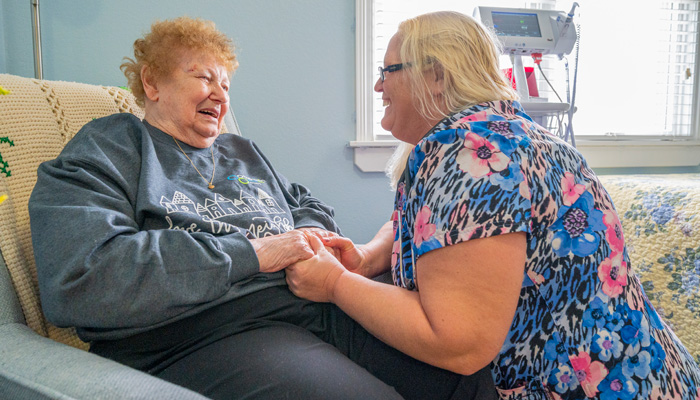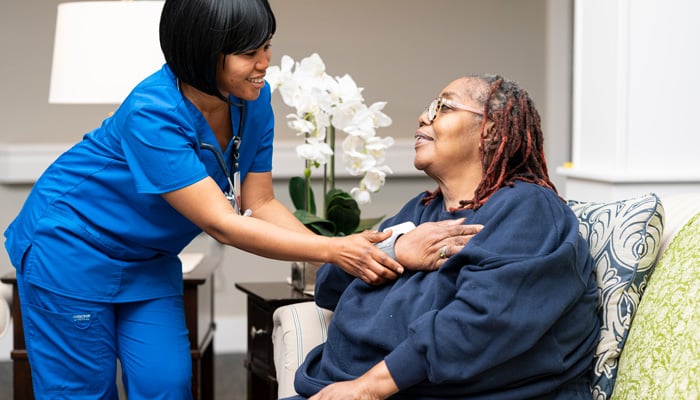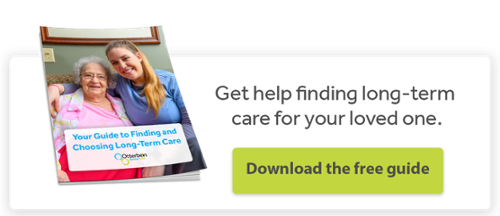Updated in November 2022
In this blog, the first in a four-part series on skilled nursing care, we’ll look at signs that your loved one might benefit from this kind of care. The remaining three blogs in the series focus on how to talk about skilled nursing care with your family, what and how you can expect to pay, and ways you can find the right community for your loved one.
Over the past few weeks, you've noticed your mother’s rapidly declining health. She doesn’t drive anymore, needs help taking her medications, and is beginning to have trouble walking.
Does this mean she needs to move to a skilled nursing community? It may be time to take a closer look at signs she needs some assistance with her activities of daily living.
Signs Your Loved One Needs Skilled Nursing Care
Skilled nursing — often called long-term care — is a place for people who need continuous help with daily activities and require professional medical care.
Watching for a clear pattern of diminished physical or mental abilities is helpful. A single sign, such as forgetting to return a phone call or missing an appointment, doesn’t mean that your loved one is ready to move into long-term care.
Inability to Manage Responsibilities
Daily life requires us to juggle all kinds of things — appointments, phone calls, bills, money management, and more. People of any age are bound to forget something at times. So, don’t worry if this happens to your loved one on occasion.
However, if your loved one is having trouble remembering to pay bills each month, is forgetting important appointments, or seems overwhelmed with these types of tasks, they may benefit from additional care.
Declining Physical Health and Abilities
Declining physical health and abilities is one of the easier signs to look for. You’ll likely notice if your loved one has trouble getting around, keeping themselves and their home clean, or feeding themselves.
If you’re not sure where your loved one falls on this spectrum, try sharing your concerns with your loved one's physician. They may use a tool like the Katz Index of Independence in Activities of Daily Living to evaluate your loved one's routine tasks.
A higher score may indicate that your loved one only needs a helping hand with some daily activities and is not necessarily appropriate for skilled nursing or long-term care. On the other hand, a lower score may indicate that your loved one may require continuous help with activities of daily living to remain safe and maintain a good quality of life.
Here are some activities of daily living to observe when watching for signs of declining health:
- Bathing - How much direction and personal assistance does your loved one require to remain safe while bathing?
- Dressing - Can your loved one get dressed on their own, or do they need help choosing clothes and putting them on?
- Toileting - Does your loved one have difficulty transferring to and from the toilet?
- Transferring - Is your loved one able to get in and out of furniture or their bed without assistance?
- Continence - Is your loved one experiencing partial or total incontinence of their bowel or bladder?
- Feeding - Can your loved one feed themselves, or do they need help?
Related: Is a Small House Neighborhood Right for Your Loved One? >

Consider Your Own Ability to Help
You or other family members may be able to assist your loved one daily. If so, you could delay a move to a skilled nursing or long-term care community. But if you don’t live close by, can’t get time off to help, or are financially unable to be a caregiver, you'll need to consider other options like long-term care in a senior living community.
It's also important to consider your own health when deciding if it's feasible to care for a loved one. Caregiving can take a toll on a caregiver's mental and physical health. You'll want to ensure you have other available resources to help when you need a break, experience an illness, or want to travel on a vacation.
You can usually find respite care for caregivers and their loved ones at senior living communities. Research what resources are available nearby so you're better prepared, especially when an unexpected need comes up.
In the next part of this four-part series on skilled nursing, you’ll learn how to talk to your loved one and other family members about your concerns, and how to establish the next steps.
Read Part 2: How to Talk About Long-Term Care With Your Loved One
Your Guide to Skilled Nursing
Navigating the world of skilled nursing and long-term care can be tricky, especially if you're new to the topic. That's why we've put together a free guide to help you assess your loved one's need for long-term care, talk to your family about this choice, and plan and pay for care. The guide will also provide guidance on how to research and choose a long-term care community.
Download the entire guide here.



